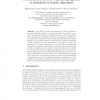Free Online Productivity Tools
i2Speak
i2Symbol
i2OCR
iTex2Img
iWeb2Print
iWeb2Shot
i2Type
iPdf2Split
iPdf2Merge
i2Bopomofo
i2Arabic
i2Style
i2Image
i2PDF
iLatex2Rtf
Sci2ools
116
click to vote
EUROGP
2007
Springer
2007
Springer
A Grammatical Genetic Programming Approach to Modularity in Genetic Algorithms
The ability of Genetic Programming to scale to problems of increasing difficulty operates on the premise that it is possible to capture regularities that exist in a problem environment by decomposition of the problem into a hierarchy of modules. As computer scientists and more generally as humans we tend to adopt a similar divide-and-conquer strategy in our problem solving. In this paper we consider the adoption of such a strategy for Genetic Algorithms. By adopting a modular representation in a Genetic Algorithm we can make efficiency gains that enable superior scaling characteristics to problems of increasing size. We present a comparison of two modular Genetic Algorithms, one of which is a Grammatical Genetic Programming algorithm, the meta-Grammar Genetic Algorithm (mGGA), which generates binary string sentences instead of traditional GP trees. A number of problems instances are tackled which extend the Checkerboard problem by introducing different kinds of regularity and noise. T...
Related Content
| Added | 07 Jun 2010 |
| Updated | 07 Jun 2010 |
| Type | Conference |
| Year | 2007 |
| Where | EUROGP |
| Authors | Erik Hemberg, Conor Gilligan, Michael O'Neill, Anthony Brabazon |
Comments (0)

